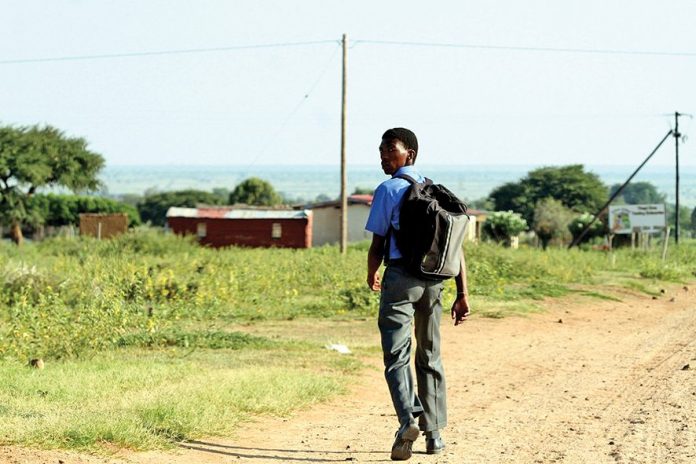Johannesburg- Pressure is mounting on the Department of Basic Education to ditch the rotational learning and staggered attendance system that has been largely blamed for thousands of pupils dropping out of school since the advent of Covid-19.
This is as the department on Tuesday said as many as 700 000 children had dropped out of school due to Covid-19 disruptions.
According to teachers and education activists who spoke to Sunday World, schools are battling to get pupils back in class because they had become despondent and demotivated.
“We are seeing a crisis unfolding before our eyes because learners are disappearing without a trace,” said Mthembeni Nsele, a teacher at Mandeni Primary School under the Ilembe district in KwaZulu-Natal.
“Hundreds of learners in lower grades are falling through the cracks as they decide not to come to school because they haven’t grasped the concept of rotational learning.”
He said unless something drastic was done, the 2022 academic year would see a bloodbath, predicting the highest number of pupils that will not be re-enrolled.
Exacerbating the crisis is the fact that the department does not have a proper tracking system for those who have dropped out and is unable to give accurate figures of pupils who are no longer in the system.
Siphelele Nhleko, a teacher at Ubuhle Bolwazi Secondary under Mpumalanga province’s Gert Sibande district, said rotational learning has disrupted the curriculum, and teachers were battling to finish the syllabus.
“There is a heavy load on teachers to prepare and repeat lessons to different groups of learners and it’s often difficult to finish the syllabus. There is also a high rate of absenteeism among learners, schools are not coping,” said Nhleko.
The Minister of Basic Education Angie Motshekga this week announced that primary schools can resume learning at full capacity provided that all
Covid-19 protocols are adhered to, while secondary schools will continue with rotational learning.
Professor Chika Sehoole, the dean of the faculty of education at the University of Pretoria, said most schools in rural areas had deteriorating conditions, which also contributed to school dropouts.
“Those numbers are a manifestation of phenomenal social ills of this country whereby we’ve got chartered families that face hardships of life, especially in rural areas, whereby children take up to three months without going to school. It might not be easy for them without adult supervision to be motivated to be in schools,” Sehoole said.
Professor Kobus Maree, in the department of educational psychology, under the faculty of education at the University of Pretoria, said many parents lost their jobs, while many learners were compelled to study at home with no parental control.
“Learners struggled to cope with their school work, fell behind and became demotivated and unwilling to attend school, fearing that they would in any event not pass, learners could not cope with isolation and being unable to communicate with their friends to ‘normalise’ their feelings of uncertainty and insecurity, many began to experience a form of depression/ sadness, many began to believe that there was little motivation to carry on with their school work,” he said.
Education activist Simon Magudulela said another cohort of pupils who were ignored by the system were those with disabilities and were attending special schools.
“In one of the special schools known as Sisizakele, there are several learners with disabilities who are no longer at school. The school itself is near collapse. There hasn’t been any intervention to get these learners back to the classroom,” said Magudulela.
Sisizakele is the only special school located in the uMkhanyakude district, one of the poorest districts in the country. UMkhanyakude covers local municipalities such as uMhlabuyalingana, Jozini, Big Five False Bay, and Mtubatuba.
Principals in Khayelitsha, Cape Town said the system had seen an increase in the number of dropouts despite there being other reasons. Western Cape MEC for Education Debbie Schafer said there was strong evidence suggesting that the learning losses young people were suffering were devastating and would have long-term negative consequences.
“Implementing a rotational model in schools is not easy, it requires dedicated planning and continued pressure to keep up with the curriculum,” said Schafer.
SA Democratic Teachers Union general secretary Mugwena Maluleke said the union was concerned with reports that over 500 000 pupils could have been lost from the system.
“We are calling for a greater investment in a digital strategy so that interventions such as blended learning can be possible, and so that the inequality gap can be significantly reduced,” said Maluleke.
The department is currently developing new legislation to address the high dropout rate. The legislation would also hold teachers, parents, and SGBs
accountable for non-attendance.
When contacted by Sunday World to explain the huge difference in the dropout rate projected by the department, education spokesperson Elijah Mhlanga said:
“Covid has forced the department to go into rotational time-tabling which has presented the department with a huge challenge. In a case where learners rotate on a weekly basis, learners go on for a long period of absence from school but it doesn’t mean they have dropped out.”
Mhlanga identified pregnancy; arrest; pupils being required to provide for child-headed households; death; failure and repeating of grades; and drug and substance abuse as some of the main reasons that have been identified as the cause of the dropout rate.
He said the department’s interventions to curb the dropout rate include school feeding programmes to provide relief to pupils from poor families; learner transport services to assist with access to school; and learner support programmes on target curriculum interventions.
For more education news from Sunday World, click here.
Follow @SundayWorldZA on Twitter and @sundayworldza on Instagram, or like our Facebook Page, Sunday World, by clicking here for the latest breaking news in South Africa. To Subscribe to Sunday World, click here.



